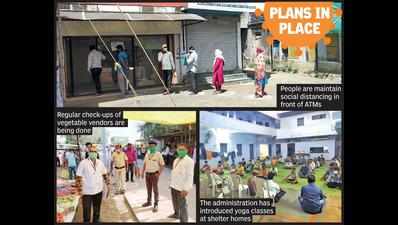- News
- City News
- nagpur News
- Wardha tries modified lockdown to keep essentials working
Trending
This story is from April 12, 2020
Wardha tries modified lockdown to keep essentials working

Nagpur: Just a few days after the nationwide lockdown was announced, Wardha district has been successfully experimenting by opening up certain shops on a weekly basis to ensure critical supply chain does not get interrupted. Right from electrical shops to mobile repair and optical shops are open once a week for a few hours and authorities ensure social distancing norms are not flouted.
Wardha’s collector Vivek Bhimanwar has been leading this experiment using innovative ideas and feedback from people.“The more you go out and meet people affected by the lockdown, you start understanding their requirements. Now edible oil is an essential commodity. Oil factory owners told us of their requirement of some critical electrical parts. Unless we keep critical supply chain of accessories also open, in the long run the supply of essential services cannot be ensured,” said Bhimanwar.
But he realized that keeping them open everyday will create problems. “It will defeat the purpose of lockdown and that’s why I decided to keep electrical shops open once a week. Somebody talked about not having prescription eyewear and how it is hindering their day to day activity, so we opened up optical shops on a weekly basis,” said Bhimanwar.
Mobile repair shops are ensuring there is no breakdown of communication during the lockdown. For hardware shops, they are currently operating on a business-to-business (B2B) format. Whenever these shops open, officials are present to ensure that social distancing is followed.
Marking on ground has been done to indicate where people must stand on the ground, pavement etc in front of banks, ATMs and all shops that have permission to be open.
Another challenge that Bhimanwar faced was handling migrant labourers, whose numbers jumped from 3,000-odd to just over 8,000 within a week. “Many labourers were passing through our district on their way back. They have been housed in 60 different buildings. We are conducting daily yoga classes and counselling sessions for them with the help social organizations to keep them mentally occupied,” said Bhimanwar.
The district, nationally known for Mahatma Gandhi’s Sewagram ashram, has been leading the way in other ways as well. They were the first to sanitize streets in urban area, first to experiment with open group vegetable markets and start with medical check up of vegetable vendors too.
Wardha’s collector Vivek Bhimanwar has been leading this experiment using innovative ideas and feedback from people.“The more you go out and meet people affected by the lockdown, you start understanding their requirements. Now edible oil is an essential commodity. Oil factory owners told us of their requirement of some critical electrical parts. Unless we keep critical supply chain of accessories also open, in the long run the supply of essential services cannot be ensured,” said Bhimanwar.
But he realized that keeping them open everyday will create problems. “It will defeat the purpose of lockdown and that’s why I decided to keep electrical shops open once a week. Somebody talked about not having prescription eyewear and how it is hindering their day to day activity, so we opened up optical shops on a weekly basis,” said Bhimanwar.
Mobile repair shops are ensuring there is no breakdown of communication during the lockdown. For hardware shops, they are currently operating on a business-to-business (B2B) format. Whenever these shops open, officials are present to ensure that social distancing is followed.
For distribution of food grains through ration shops, Bhimanwar was initially worried about overcrowding. “There are about 850 shops in district and we divided them in descending order of number of beneficiaries. Some shops have 3,000-plus beneficiaries while some have just 200-odd. Wherever the beneficiaries were high, a big team of volunteers who are ex-servicemen and officials headed by a district nodal officer ensured crowd movement is systematic with all norms of social distancing being followed,” said Bhimanwar.
Marking on ground has been done to indicate where people must stand on the ground, pavement etc in front of banks, ATMs and all shops that have permission to be open.
Another challenge that Bhimanwar faced was handling migrant labourers, whose numbers jumped from 3,000-odd to just over 8,000 within a week. “Many labourers were passing through our district on their way back. They have been housed in 60 different buildings. We are conducting daily yoga classes and counselling sessions for them with the help social organizations to keep them mentally occupied,” said Bhimanwar.
The district, nationally known for Mahatma Gandhi’s Sewagram ashram, has been leading the way in other ways as well. They were the first to sanitize streets in urban area, first to experiment with open group vegetable markets and start with medical check up of vegetable vendors too.
End of Article
FOLLOW US ON SOCIAL MEDIA










